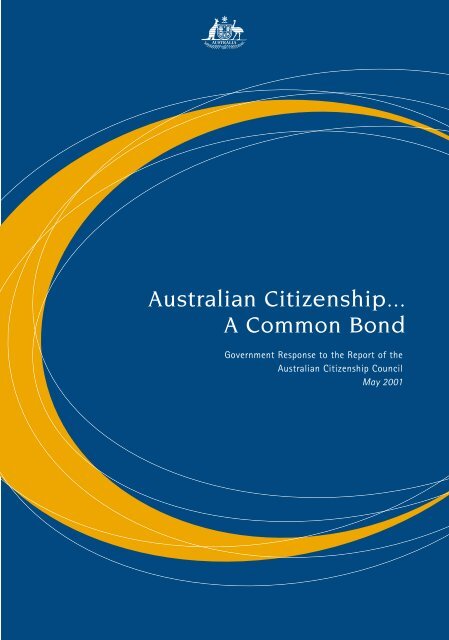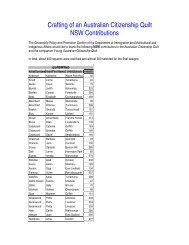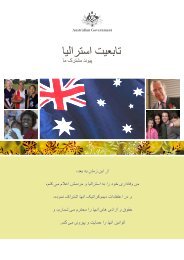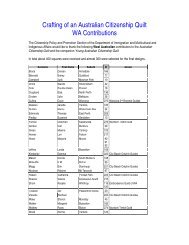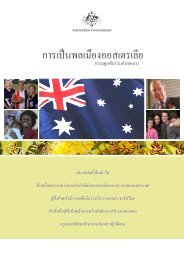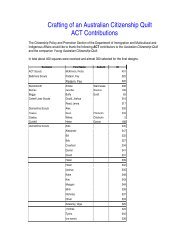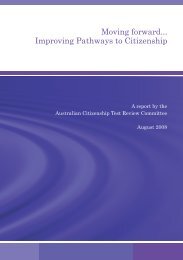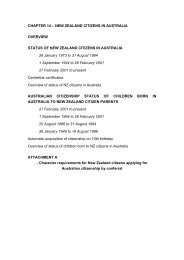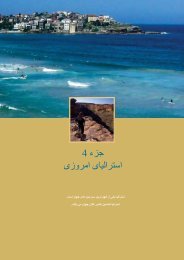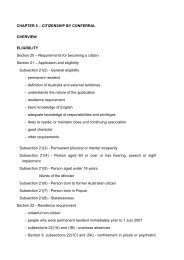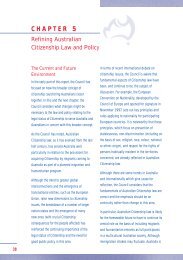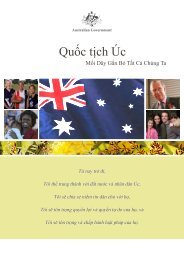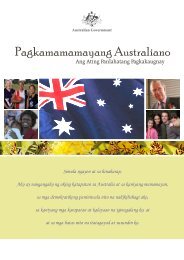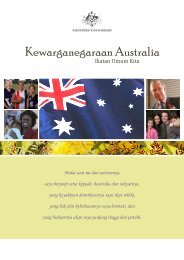Australian Citizenship... A Common Bond
Australian Citizenship... A Common Bond
Australian Citizenship... A Common Bond
Create successful ePaper yourself
Turn your PDF publications into a flip-book with our unique Google optimized e-Paper software.
<strong>Australian</strong> <strong>Citizenship</strong>...<br />
A <strong>Common</strong> <strong>Bond</strong><br />
Government Response to the Report of the<br />
<strong>Australian</strong> <strong>Citizenship</strong> Council<br />
May 2001
<strong>Australian</strong> <strong>Citizenship</strong>...<br />
A <strong>Common</strong> <strong>Bond</strong><br />
Government Response to the Report of the<br />
<strong>Australian</strong> <strong>Citizenship</strong> Council
© Copyright: <strong>Common</strong>wealth of Australia 2001<br />
ISBN 0-642-70523-2<br />
This work is copyright. It may be reproduced in the whole or in part for study or training<br />
purposes subject to the inclusion of an acknowledgement of the source and no commercial<br />
usage or sale. Reproduction for purposes other than those indicated above, require the<br />
prior written permission from the <strong>Common</strong>wealth available from AusInfo. Requests and<br />
inquiries concerning reproduction and rights should be addressed to the Manager,<br />
Legislative Services, AusInfo, GPO Box 1920, Canberra, ACT 2601.
Foreword<br />
On 18 February 2000 I launched the <strong>Australian</strong> <strong>Citizenship</strong> Council’s Report <strong>Australian</strong><br />
<strong>Citizenship</strong> for a New Century. The Council’s Report has been very positively received by the<br />
community and I would like to record my deep appreciation to Sir Ninian Stephen as Chair<br />
and all Council Members for their outstanding contribution to <strong>Australian</strong> citizenship.<br />
The Government is pleased to note the Council’s conclusion that <strong>Australian</strong> citizenship is a<br />
success story and that <strong>Australian</strong> citizenship policy and law are working well. However, the<br />
Government shares the Council’s view that we can do more with our citizenship, both in its<br />
broad and legal sense. In this response we introduce a number of initiatives to build on the<br />
concept of <strong>Australian</strong> citizenship as a unifying force in our community and to help create<br />
an even more robust <strong>Australian</strong> citizenship for the 21st Century.<br />
The Government’s response is designed to encourage all <strong>Australian</strong>s to value their<br />
citizenship and to reflect on its meaning, particularly during the Centenary of Federation.<br />
We have adopted a range of ideas which will provide a focal point for the community on<br />
citizenship.<br />
We will also make a special effort to encourage more eligible non-citizens to take up<br />
<strong>Australian</strong> citizenship in the Centenary year.<br />
The emphasis in relation to <strong>Australian</strong> citizenship law and policy is on continuity rather<br />
than change and no changes are to be made to the basic criteria for the grant of<br />
<strong>Australian</strong> citizenship. However, we will legislate to tighten aspects of the character<br />
provisions and widen some provisions to benefit children and young adults.<br />
<strong>Australian</strong> citizenship is an important common bond for all <strong>Australian</strong>s, whether<br />
<strong>Australian</strong>s by birth or by choice. The combined effect of the initiatives outlined in the<br />
Government’s response to the <strong>Australian</strong> <strong>Citizenship</strong> Council’s Report deal with the very<br />
nature of our society and the essence of being <strong>Australian</strong>. As such, they are relevant to<br />
each and every <strong>Australian</strong>.<br />
Philip Ruddock<br />
Minister for Immigration and Multicultural Affairs<br />
Minister for Reconciliation and Aboriginal and Torres Strait Islander Affairs<br />
May 2001<br />
Page 3
Overview<br />
The <strong>Common</strong>wealth Government welcomes the <strong>Australian</strong> <strong>Citizenship</strong> Council’s Report<br />
‘<strong>Australian</strong> <strong>Citizenship</strong> for a New Century’ and considers it to be a most important<br />
contribution to the contemporary discussion of <strong>Australian</strong> citizenship – a matter of<br />
relevance to all <strong>Australian</strong>s.<br />
The <strong>Australian</strong> <strong>Citizenship</strong> Council undertook, as part of its preparatory work, a public<br />
consultative process based around its Issues Paper “Contemporary <strong>Australian</strong> <strong>Citizenship</strong>”.<br />
Some 6,000 copies of the Council’s Issues Paper were widely distributed both in Australia<br />
and overseas and 200 responses were received. The Government circulated some 6,000<br />
copies of the Council’s final Report to community groups, contributors to the Council’s<br />
Report, local councils and State/Territory Governments, to seek the community’s reaction<br />
to its conclusions and recommendations. Over 110 responses were received from both<br />
within Australia and overseas, and many letters and e-mails have taken up specific matters<br />
contained in the Council’s Report. The views of all contributors have greatly helped inform<br />
the development of the Government’s response.<br />
The Government agrees with the Council’s view that, overall, the law and policy relating to<br />
<strong>Australian</strong> <strong>Citizenship</strong> are working well and that, over its fifty years of existence, the legal<br />
status of <strong>Australian</strong> <strong>Citizenship</strong> has been a major success story in providing a new legal<br />
status for those in Australia at the time of its introduction and having welcomed over<br />
three million newcomers into the <strong>Australian</strong> community as fully participating members.<br />
The Government also believes that still more can be made of <strong>Australian</strong> citizenship, as a<br />
unifying concept, particularly by extending the focus to shared civic values in addition to<br />
the legal status of <strong>Australian</strong> <strong>Citizenship</strong>. The Centenary of Federation provides a unique<br />
opportunity to promote <strong>Australian</strong> citizenship in both its broader and legal senses.<br />
<strong>Australian</strong> <strong>Citizenship</strong>…<br />
A <strong>Common</strong> <strong>Bond</strong><br />
<strong>Australian</strong> <strong>Citizenship</strong> is a common bond at the heart of a unified and inclusive Australia<br />
and it is our shared civic values that underpin <strong>Australian</strong> citizenship, in both the broad and<br />
legal sense and serve to unify us as a nation. <strong>Australian</strong> citizenship and its defining,<br />
Page 4
unifying role is for all <strong>Australian</strong>s. The Government therefore, strongly welcomes a<br />
community focus on citizenship that will bring <strong>Australian</strong>s closer together.<br />
The Government will establish an <strong>Australian</strong> <strong>Citizenship</strong> Day to further highlight <strong>Australian</strong><br />
citizenship as a unifying force within the community with activities and initiatives<br />
designed to reinforce the benefits of unity. 17 September, the anniversary of the renaming<br />
of the Nationality and <strong>Citizenship</strong> Act in 1973 to the <strong>Australian</strong> <strong>Citizenship</strong> Act 1948, will<br />
be celebrated for this purpose, each year from 2001.<br />
The Government will continue to provide opportunities for <strong>Australian</strong> citizens to publicly<br />
‘affirm’ their loyalty to Australia and its people, at appropriate occasions. The ‘affirmation’<br />
is based on the wording of the <strong>Australian</strong> <strong>Citizenship</strong> Pledge used by migrants when they<br />
become <strong>Australian</strong> Citizens and affirmation ceremonies could be usefully undertaken as<br />
part of the celebrations of <strong>Australian</strong> civic values during the Centenary of Federation and<br />
beyond. Most <strong>Australian</strong>s have not previously had an opportunity to express their<br />
commitment to Australia, and the response at a number of occasions where these<br />
initiatives were trialed during the 50th anniversary of <strong>Australian</strong> citizenship was very<br />
positive. Accordingly, the Government will continue to build on these initiatives as part of<br />
its overall effort to promote civic values during the Centenary year.<br />
The Government will continue to support the process of reconciliation in the community<br />
and support practical initiatives which will enable Aboriginal and Torres Strait Islander<br />
peoples to share in the general success of the community, as an important part of a fully<br />
inclusive <strong>Australian</strong> citizenship.<br />
The Government endorses the Council’s view that the small differential of responsibilities<br />
and privileges between <strong>Australian</strong> Citizens and permanent residents should not be<br />
widened. However, full civic participation is to be encouraged and it is important that we<br />
strive for a unified and inclusive <strong>Australian</strong> community from both the legal and broad<br />
perspective of <strong>Australian</strong> citizenship.<br />
<strong>Australian</strong> <strong>Citizenship</strong> in<br />
the Centenary Year<br />
The Government endorses the Council’s emphasis on the importance of the Centenary of<br />
Federation in the context of <strong>Australian</strong> citizenship. The Centenary of Federation is a time<br />
when <strong>Australian</strong>s are reflecting on the civic values that unite us as a nation one hundred<br />
years later, so this provides an ideal focal point for citizenship activities.<br />
Page 5
In addition to the initiatives relating to the establishment of an <strong>Australian</strong> <strong>Citizenship</strong> Day<br />
and affirmation ceremonies for <strong>Australian</strong>s, the Government wishes to give due emphasis<br />
to the legal status of <strong>Australian</strong> <strong>Citizenship</strong>.<br />
The Government is conscious that there are currently some 950,000 permanent residents<br />
who are eligible to take out <strong>Australian</strong> <strong>Citizenship</strong> but have not yet taken that step. A<br />
special effort is therefore to be made during the Centenary of Federation year to promote<br />
the concept of <strong>Australian</strong> citizenship in the wider community and to encourage its<br />
acquisition by some of these eligible non-Citizens.<br />
The Government will continue to encourage civics and citizenship education in the<br />
<strong>Australian</strong> community and will pursue further initiatives through the Adult Migrant English<br />
Program (AMEP). These initiatives will give migrants an opportunity to learn, among other<br />
things, about the responsibilities and privileges of <strong>Australian</strong> <strong>Citizenship</strong>, Australia’s<br />
representative democracy, legal system and history. This will assist migrants in meeting the<br />
requirements for <strong>Australian</strong> <strong>Citizenship</strong>.<br />
Refining <strong>Australian</strong> <strong>Citizenship</strong><br />
Policy and Law, including:<br />
• Initiatives for Young <strong>Australian</strong>s<br />
• Strengthened Integrity Measures<br />
• Loss of <strong>Australian</strong> <strong>Citizenship</strong><br />
The Government agrees with the Council that <strong>Australian</strong> <strong>Citizenship</strong> law and policy are<br />
mostly about right and working well and that the focus for the future of <strong>Citizenship</strong> law<br />
be on continuity rather than change.<br />
The Government agrees that the overall inclusive and non-discriminatory approach to<br />
<strong>Australian</strong> <strong>Citizenship</strong>, that is characterised in current <strong>Australian</strong> <strong>Citizenship</strong> law, of<br />
welcoming, without undue barriers, migrants and humanitarian entrants who come to<br />
Australia as part of the planned migration and humanitarian programs, should continue as<br />
the basis for future <strong>Australian</strong> <strong>Citizenship</strong> policy and law.<br />
Page 6
Accordingly, the Government agrees that the basic criteria for the grant of <strong>Australian</strong><br />
<strong>Citizenship</strong> should neither be made harder nor easier.<br />
Equally the Government agrees that the decision to take out <strong>Australian</strong> <strong>Citizenship</strong> is an<br />
important life choice which should be taken voluntarily and be indicative of a commitment<br />
to Australia.<br />
Clearly, some aspects of Australia’s <strong>Citizenship</strong> legislation need, over time, to evolve to<br />
reflect the changing values of the <strong>Australian</strong> community and the Government will<br />
implement the recommendations of the Council in relation to those areas where<br />
<strong>Citizenship</strong> law requires a strengthening of existing integrity measures and further<br />
enhancements.<br />
The Government will pursue some enhancements to the <strong>Australian</strong> <strong>Citizenship</strong> Act 1948 in<br />
the interests of younger <strong>Australian</strong>s. An extension of the descent and resumption<br />
provisions will give young adult <strong>Australian</strong>s more opportunities to acquire <strong>Australian</strong><br />
<strong>Citizenship</strong>. Also, children who acquire <strong>Australian</strong> <strong>Citizenship</strong> with their parents will be<br />
given their own <strong>Citizenship</strong> certificates.<br />
The integrity of the acquisition of <strong>Citizenship</strong> process will be strengthened in relation to<br />
‘good character’ by increasing the time limits before a person with multiple serious<br />
convictions can be considered for <strong>Citizenship</strong>. Other integrity measures include the insertion<br />
of a requirement to be of ‘good character’ when resuming <strong>Australian</strong> <strong>Citizenship</strong>, given the<br />
passage of time, in some cases, between loss and resumption of <strong>Citizenship</strong>.<br />
The Government is disposed to support the <strong>Australian</strong> <strong>Citizenship</strong> Council’s<br />
recommendation to repeal section 17 of the <strong>Australian</strong> <strong>Citizenship</strong> Act 1948 (which<br />
provides for loss of <strong>Australian</strong> <strong>Citizenship</strong> upon acquisition of another <strong>Citizenship</strong>).<br />
However, given the significance of this change to longstanding <strong>Australian</strong> <strong>Citizenship</strong> law<br />
and practice, it is important that the community has a further opportunity to express its<br />
views. Accordingly, the Government intends to issue a discussion paper inviting community<br />
views on this specific issue before making a final decision.<br />
The following section contains the Government response to each of the 64<br />
recommendations made by the <strong>Australian</strong> <strong>Citizenship</strong> Council.<br />
Page 7
Responses to the Council’s<br />
Recommendations<br />
The Report of the <strong>Australian</strong> <strong>Citizenship</strong> Council, <strong>Australian</strong> <strong>Citizenship</strong> for a New Century,<br />
made 64 recommendations to the Government. The Government Response to these<br />
recommendations is as follows.<br />
<strong>Citizenship</strong> Serving Australia and <strong>Australian</strong>s<br />
Recommendation 1: The Council recommends that the <strong>Common</strong>wealth Government take<br />
a lead in promoting not only the broad civic values that unite <strong>Australian</strong>s but also the<br />
legal status of <strong>Australian</strong> <strong>Citizenship</strong> within the <strong>Australian</strong> community.<br />
Government Response: The Government believes that the civic values that underpin <strong>Australian</strong><br />
citizenship, together with the legal status of <strong>Australian</strong> <strong>Citizenship</strong>, are central unifying<br />
elements in Australia’s diverse society. They are at the heart of a unified and cohesive Australia<br />
and are symbolic of that unity. The Government agrees that more needs to be done to improve<br />
community understanding of these civic values and their role in bringing the nation closer<br />
together, as well as to promote the acquisition of <strong>Australian</strong> <strong>Citizenship</strong> by eligible persons.<br />
The <strong>Australian</strong> Compact<br />
Recommendation 2: The Council recommends that immediately preceding the Centenary<br />
of Federation year the <strong>Common</strong>wealth, State and Territory parliaments make a nonpartisan<br />
declaration on the significance of, and values contained in, the ‘<strong>Australian</strong><br />
Compact’ developed by the Council and that their members adopt the seven basic<br />
principles of the ‘Compact’, with its commitment:<br />
• To respect and care for the land we share;<br />
• To maintain the rule of law and the ideal of equality under the law of all <strong>Australian</strong>s;<br />
• To strengthen Australia as a representative liberal democracy based on universal adult<br />
suffrage and on freedom of opinion;<br />
• To uphold the ideal of Australia as a tolerant and fair society;<br />
• To recognise and celebrate Australia as an inclusive multicultural society which values<br />
its diversity;<br />
• To continue to develop Australia as a society devoted to the wellbeing of its people;<br />
• To value the unique status of the Aboriginal and Torres Strait Islander peoples.<br />
Page 8
Government Response: The Government considers that the idea of an ‘<strong>Australian</strong> Compact’<br />
is an innovative one and acknowledges that the values in the text proposed by the Council<br />
are embedded in <strong>Australian</strong> society, institutions and value statements in one form or<br />
another. However, the Government believes that there is no strong community demand for<br />
an additional value statement sponsored by Government and therefore does not intend to<br />
pursue a declaration at this time.<br />
Recommendation 3: The Council recommends that the <strong>Australian</strong> Compact be used as the<br />
foundation for a promotion strategy to encourage <strong>Australian</strong>s to strengthen their civic<br />
values as citizens and, in the hundredth anniversary year of their <strong>Common</strong>wealth, to<br />
proclaim their belief in and commitment to certain declared civic values.<br />
Government Response: See the Government Response to Recommendation 2.<br />
Recommendation 4: The Council recommends that a small, accessible, easy-tounderstand<br />
booklet be prepared, explaining the seven principles of the ‘<strong>Australian</strong><br />
Compact’. To begin with, this could be available for distribution during the Centenary year.<br />
But many other uses could be found for it following the Centenary year.<br />
Government Response: See the Government Response to Recommendation 2. Although the<br />
Government does not intend to sponsor a booklet on the Compact, it will continue to prepare<br />
other material which will assist the community in understanding citizenship and civic values.<br />
Recommendation 5: The Council recommends that all political leaders (including Local<br />
Government leaders) use the 2001 Centenary of Federation commemorations to launch to<br />
a wider audience the <strong>Australian</strong> <strong>Citizenship</strong> Pledge, and the concept of affirmation<br />
ceremonies for <strong>Australian</strong> Citizens and <strong>Australian</strong>s, as a normal part of the Centenary<br />
ceremonies, with the aim of further extending their use when the Centenary<br />
commemorations are over.<br />
Government Response: The Government believes that the <strong>Australian</strong> <strong>Citizenship</strong> Pledge, a<br />
statement of commitment made by those about to become <strong>Australian</strong> Citizens, and<br />
affirmation ceremonies for <strong>Australian</strong> Citizens, using a modified form of the Pledge that has<br />
been developed for this purpose, are both expressions of commitment to the core civic values<br />
which are at the heart of being <strong>Australian</strong>. The Government further believes there is<br />
significant value in the promotion of both the Pledge and affirmation ceremonies by political<br />
and other key community leaders, particularly in the context of wider activities to celebrate<br />
the Centenary of Federation.<br />
See also the Government Response to Recommendations 12, 13 and 14 in relation to<br />
affirmation ceremonies.<br />
Page 9
Recommendation 6: So that there will be a continuing means of expressing <strong>Australian</strong><br />
civic unity in an attractive form, the Council recommends that appropriate authorities<br />
disseminate throughout the year the <strong>Australian</strong> <strong>Citizenship</strong> Pledge, along with the Joint<br />
Parliamentary Statement on Racial Tolerance unanimously passed by Parliament on 30<br />
October 1996, the principles of <strong>Australian</strong> multiculturalism enunciated by the National<br />
Multicultural Advisory Council in its Report <strong>Australian</strong> multiculturalism for a new century:<br />
Towards inclusiveness (April 1999) and adopted by the <strong>Common</strong>wealth Government and<br />
any document that comes out of the reconciliation process.<br />
Government Response: The Government agrees that there is significant value in<br />
promulgating materials that give memorable expression to civic belief, including through the<br />
distribution of posters for use at <strong>Citizenship</strong> ceremonies, schools and appropriate public<br />
places, and will pursue opportunities for doing this throughout the Centenary year.<br />
The Government notes that significant dissemination of civic related materials already takes<br />
place. Posters of the <strong>Australian</strong> <strong>Citizenship</strong> Pledge, for example, are made routinely available<br />
for display during <strong>Citizenship</strong> ceremonies and given to children who take out <strong>Australian</strong><br />
<strong>Citizenship</strong>. During 1999, the 50th anniversary of <strong>Australian</strong> citizenship, a range of<br />
anniversary pins and badges were also distributed while citizenship kits containing a range<br />
of citizenship-related information and other materials were disseminated to schools across<br />
the nation.<br />
Core Civic Values and <strong>Australian</strong> Multiculturalism<br />
Recommendation 7: The Council welcomes the National Multicultural Advisory Council’s<br />
recommendation that support for core civic values should be the first of the four principles<br />
of <strong>Australian</strong> multiculturalism and adoption of these principles by the <strong>Common</strong>wealth<br />
Government and recommends that the principles of the ‘<strong>Australian</strong> Compact’ should play<br />
an essential part in discussion on the civic values involved in ‘<strong>Australian</strong> multiculturalism’.<br />
Government Response: In the ‘New Agenda for Multicultural Australia’ the Government has<br />
adopted the four principles of <strong>Australian</strong> Multiculturalism recommended by the National<br />
Multicultural Advisory Council. The Government considers that discussion of the civic values<br />
involved in <strong>Australian</strong> Multiculturalism can proceed independently.<br />
Looking for the Distinctive<br />
Recommendation 8: The Council recommends that, as a Centenary of Federation project,<br />
an international conference in comparative government and comparative political culture<br />
be arranged, with representatives from a range of countries. This would in itself be a<br />
Page 10
unique contribution to the study of comparative government and comparative political<br />
culture and it might also prompt serious consideration in Australia of what it is that is<br />
distinctive in the <strong>Australian</strong> polity.<br />
Government Response: The Government will seek to encourage academic institutions to<br />
arrange an international conference in comparative government and comparative political<br />
culture.<br />
Recommendation 9: In view of what would be the Australia-wide, national and<br />
international focus of the proposed conference in comparative government and<br />
comparative political culture (see Recommendation 8), the Council recommends that seed<br />
funding be provided by the <strong>Common</strong>wealth Government through the Immigration and<br />
Multicultural Affairs portfolio to assist in the organisation of the conference.<br />
Government Response: While the Government will seek to encourage the organisation of<br />
an international conference, direct seed funding will not be provided.<br />
Civics and <strong>Citizenship</strong> Education<br />
Recommendation 10: The Council strongly endorses the Discovering Democracy program,<br />
a significant <strong>Common</strong>wealth initiative of civics and citizenship education in schools, and<br />
recommends that it continue to be part of the <strong>Australian</strong> school curriculum and that it be<br />
extended to Years 11 and 12.<br />
Government Response: The Government strongly supports civics and citizenship education<br />
in the school system as a means of enhancing <strong>Australian</strong>s’ ability to participate in, and<br />
contribute to, community life as informed and responsible citizens. This would benefit both<br />
individuals and the wider community.<br />
The Discovering Democracy program, which was funded at $18 million over the four years<br />
1997-2000, has been allocated additional funding of $13.4 million over the four years to<br />
2004 to allow this successful program to become further embedded in <strong>Australian</strong> schools.<br />
Further consideration will be given to extending the program to Years 11 and 12.<br />
General <strong>Citizenship</strong> Material<br />
Recommendation 11: The Council recommends the continuing production and distribution<br />
of citizenship educational and promotional material, including booklets, posters and pins,<br />
by the Department of Immigration and Multicultural Affairs, for wide distribution at<br />
<strong>Australian</strong> <strong>Citizenship</strong> conferral ceremonies and other appropriate functions and occasions<br />
beyond the fiftieth anniversary year.<br />
Page 11
Government Response: The Government provides considerable materials designed both to<br />
educate about Australia and aspects of the <strong>Australian</strong> way of life, and to promote <strong>Australian</strong><br />
<strong>Citizenship</strong> more broadly. This will be continued.<br />
Materials include a booklet, What it Means to be an <strong>Australian</strong> Citizen, which provides a<br />
brief summary of Australia’s history, heritage, symbols, institutions and laws and is<br />
distributed to all applicants for <strong>Australian</strong> <strong>Citizenship</strong>. As well, the Government produces a<br />
range of promotional posters, citizenship kits, lapel pins and badges for use at <strong>Citizenship</strong><br />
conferral ceremonies and other citizenship related functions. During 1999, citizenship kits<br />
incorporating booklets and other materials were distributed to <strong>Australian</strong> schools as part of<br />
broader activities to mark the 50th anniversary of <strong>Australian</strong> citizenship.<br />
Affirmation Ceremonies for <strong>Australian</strong> Citizens<br />
Recommendation 12: The Council recommends that affirmation ceremonies for <strong>Australian</strong><br />
Citizens be conducted at appropriate formal civic occasions. Local Government should be<br />
encouraged to continue to provide on an ongoing basis after completion of the 50th<br />
anniversary year voluntary affirmation ceremonies for <strong>Australian</strong> Citizens as an extension<br />
of established procedures for conducting <strong>Australian</strong> <strong>Citizenship</strong> ceremonies for new<br />
<strong>Australian</strong> Citizens. State and Territory Governments should also be encouraged to include<br />
affirmation ceremonies at appropriate formal civic occasions which they convene.<br />
Government Response: Affirmation ceremonies provide an opportunity for <strong>Australian</strong><br />
Citizens (those born in Australia and those who have acquired <strong>Australian</strong> <strong>Citizenship</strong>), if they<br />
wish to do so, to publicly affirm their commitment to Australia and its people, its civic<br />
principles and institutions. Many of these people would not have previously had such an<br />
opportunity.<br />
The Government notes that a number of affirmation ceremonies were authorised by the<br />
Minister for Immigration and Multicultural Affairs, the Hon Philip Ruddock MP, as a pilot<br />
project during 1999, in the context of activities to mark the 50th anniversary of <strong>Australian</strong><br />
citizenship. They proved very successful, with many <strong>Australian</strong>s embracing the opportunity to<br />
affirm their loyalty to Australia and its people at a number of ceremonies around the country.<br />
The Government will continue to encourage the conduct of affirmation ceremonies for<br />
<strong>Australian</strong> Citizens.<br />
See also the Government Response to Recommendations 13 and 14.<br />
Page 12
Affirmation Ceremonies for Citizens and non-Citizens<br />
Recommendation 13: The Council recommends that State and Territory Governments as<br />
well as schools and community groups be encouraged to conduct affirmation ceremonies<br />
at appropriate occasions using a modified affirmation suitable for all <strong>Australian</strong>s, including<br />
those who are not <strong>Australian</strong> Citizens.<br />
Government Response: The Government notes that affirmation ceremonies have no status<br />
in law and no legal effect and that, in this context, there is no requirement for the Minister<br />
for Immigration and Multicultural Affairs, or his delegate, to preside over the affirmation.<br />
Affirmation ceremonies should be voluntary at all times and should be conducted at<br />
appropriate occasions.<br />
It is important to note that affirmation ceremonies are of significant symbolic importance,<br />
both to participants and the wider community, and should be conducted with dignity. To this<br />
end, the Department of Immigration and Multicultural Affairs will develop and promulgate a<br />
framework for conducting affirmation ceremonies for adults distinguishing, in particular,<br />
between the text of the affirmation suitable for <strong>Australian</strong> Citizens and the text suitable for<br />
all members of the <strong>Australian</strong> community, including those who are not <strong>Australian</strong> Citizens.<br />
Whilst the Government will continue to encourage the conduct of affirmation ceremonies on<br />
appropriate occasions, the Government will consult on the appropriateness of use of<br />
affirmation ceremonies in schools.<br />
See also the Government Response to Recommendations 12 and 14.<br />
Recommendation 14: The Council recommends that the <strong>Common</strong>wealth and State<br />
Centenary of Federation Councils promulgate the idea of affirmation ceremonies among<br />
those organising government and community events for commemorating the Centenary of<br />
Federation in 2001.<br />
Government Response: The Government will assist the <strong>Common</strong>wealth and State Centenary<br />
of Federation Councils to promote the concept of affirmation ceremonies during the Centenary<br />
of Federation in 2001, including through the development of a framework for the conduct of<br />
affirmation ceremonies and the provision of appropriate promotional and other products.<br />
See also the Government Response to Recommendations 12 and 13.<br />
Page 13
<strong>Australian</strong> Passports<br />
Recommendation 15: The Council recommends that a statement be included on<br />
<strong>Australian</strong> passports to the effect that the bearer is an <strong>Australian</strong> Citizen.<br />
Government Response: The Government believes that there is important symbolic value in<br />
the inclusion on <strong>Australian</strong> passports of a statement to the effect that the bearer is an<br />
<strong>Australian</strong> Citizen. The Government will facilitate this.<br />
Annual <strong>Citizenship</strong> Day<br />
Recommendation 16: The Council recommends to Government the proposal of the 1999<br />
National Schools Constitutional Convention that a <strong>Citizenship</strong> Day be established to allow<br />
all in Australia to celebrate their <strong>Australian</strong> <strong>Citizenship</strong>.<br />
Government Response: The Government will establish an <strong>Australian</strong> <strong>Citizenship</strong> Day on 17<br />
September (the anniversary of the renaming of the Nationality and <strong>Citizenship</strong> Act 1948 to<br />
<strong>Australian</strong> <strong>Citizenship</strong> Act 1948).<br />
Responsibilities and Privileges, and Differential<br />
Between <strong>Australian</strong> Citizens and Permanent Residents<br />
Recommendation 17: The Council recommends that there be no widening of the current<br />
differential in responsibilities and privileges between <strong>Australian</strong> Citizens and permanent<br />
residents. The Council believes that the decision to acquire <strong>Australian</strong> <strong>Citizenship</strong> is an<br />
important life choice, which should be taken voluntarily and be indicative of a clear<br />
commitment to Australia. It should not be an expedient step taken to obtain access to a<br />
particular benefit.<br />
Government Response: The Government is conscious that <strong>Australian</strong> <strong>Citizenship</strong> should be<br />
taken up voluntarily and agrees that differentials in responsibilities and privileges should not<br />
be introduced as a basis for encouraging take-up of <strong>Australian</strong> <strong>Citizenship</strong>.<br />
Recommendation 18: The Council recommends that the group of eligible permanent<br />
residents who are able to vote in <strong>Australian</strong> elections be encouraged to apply for<br />
<strong>Australian</strong> <strong>Citizenship</strong> along with all other eligible non-Citizens.<br />
Government Response: The Government will include this group as part of the target<br />
audience in promoting acquisition of <strong>Australian</strong> <strong>Citizenship</strong>.<br />
Page 14
Encouraging Eligible Permanent Residents to Become<br />
<strong>Australian</strong> Citizens<br />
Recommendation 19: The Council recommends development and implementation of an<br />
ongoing strategy to encourage eligible permanent residents to acquire <strong>Australian</strong><br />
<strong>Citizenship</strong>. This strategy should also aim to encourage knowledge and awareness of<br />
<strong>Australian</strong> <strong>Citizenship</strong> and civics within the community.<br />
Government Response: Whilst recognising the already high <strong>Citizenship</strong> rate of eligible<br />
overseas born, the Government will develop a strategy to encourage take-up of <strong>Australian</strong><br />
<strong>Citizenship</strong> by eligible persons who have been in Australia for many years as well as to<br />
continue the high take-up rates of recent arrivals.<br />
Recommendation 20: In the Council’s view, the Centenary of Federation, 2001, a<br />
significant national milestone, would provide an ideal focal point for a heightened<br />
<strong>Citizenship</strong> promotional campaign. The Council therefore recommends development and<br />
implementation of an enhanced campaign for 2001 encompassing the same goals as the<br />
ongoing strategy.<br />
Government Response: The Government will take the opportunity presented by the<br />
Centenary of Federation in 2001 to promote the acquisition of <strong>Australian</strong> <strong>Citizenship</strong>.<br />
The <strong>Australian</strong> <strong>Citizenship</strong> Pledge<br />
Recommendation 21: The Council recommends that no change be made to the current<br />
<strong>Australian</strong> <strong>Citizenship</strong> Pledge of Commitment made by those about to become <strong>Australian</strong><br />
Citizens.<br />
Government Response: The Government will retain the existing <strong>Australian</strong> <strong>Citizenship</strong> Pledge<br />
of Commitment.<br />
<strong>Citizenship</strong> and <strong>Common</strong>wealth Administration<br />
Recommendation 22: The Council recommends that the Department of Immigration and<br />
Multicultural Affairs be renamed to include ‘<strong>Citizenship</strong>’ in its title to more explicitly<br />
reflect the importance of <strong>Citizenship</strong> and the <strong>Common</strong>wealth’s role.<br />
Government Response: The Government will give further consideration to the inclusion of<br />
‘<strong>Citizenship</strong>’ in the name of the Department of Immigration and Multicultural Affairs when<br />
the administrative arrangements are next considered.<br />
Page 15
Indigenous <strong>Australian</strong>s and <strong>Citizenship</strong><br />
Recommendation 23: Believing that reconciliation and the completion of the passage of<br />
indigenous people to full realisation of their citizenship in Australia are, in the deepest<br />
sense, intimately linked, the <strong>Australian</strong> <strong>Citizenship</strong> Council wishes to offer the Council for<br />
Aboriginal Reconciliation its strongest support and recommends continued government<br />
and community involvement in the reconciliation process.<br />
Government Response: The Government encourages continuing community involvement in<br />
reconciliation and supports practical initiatives which will enable Aboriginal and Torres<br />
Strait Islander peoples to share in the general success of the community.<br />
Refining <strong>Australian</strong> <strong>Citizenship</strong> Law and Policy:<br />
The Current and Future Environment<br />
Recommendation 24: The Council recommends that the overall inclusive and nondiscriminatory<br />
approach to <strong>Australian</strong> <strong>Citizenship</strong>, that is characterised in current<br />
<strong>Australian</strong> <strong>Citizenship</strong> law, of welcoming, without undue barriers, migrants and<br />
humanitarian entrants who come to Australia as part of the planned migration and<br />
humanitarian programs, continue to be accepted by governments as the basis for future<br />
<strong>Australian</strong> <strong>Citizenship</strong> policy and law.<br />
Government Response: The Government accepts that these principles underlying <strong>Australian</strong><br />
<strong>Citizenship</strong> are a fundamental strength of <strong>Australian</strong> society and its citizenship and will<br />
continue to apply them.<br />
Acquiring <strong>Citizenship</strong> – (1) By Birth<br />
Recommendation 25: The Council recommends that the current provisions relating to the<br />
acquisition of <strong>Australian</strong> <strong>Citizenship</strong> by birth remain unchanged, but that the Government<br />
monitor the use of section 10(2)(b) of the <strong>Australian</strong> <strong>Citizenship</strong> Act 1948 and take<br />
appropriate action to tighten this provision if evidence of abuse emerges.<br />
Government Response: The Government will monitor the use of section 10(2)(b) and<br />
consider appropriate action if evidence of abuse emerges.<br />
Acquiring <strong>Citizenship</strong> – (3) By Descent<br />
Recommendation 26: The Council recommends that the current provision of the<br />
<strong>Australian</strong> <strong>Citizenship</strong> Act 1948 which specifies that children born overseas must be<br />
registered as <strong>Australian</strong> Citizens by descent before they turn 18 years of age, be extended<br />
to enable registration before a child turns 25 years of age.<br />
Page 16
Government Response: The Government agrees that young people should have an adequate<br />
period after reaching their majority to decide for themselves whether they wish to apply for<br />
<strong>Australian</strong> <strong>Citizenship</strong> by descent. Between the ages of 18 and 25, most young people examine<br />
their identity and future. The Government will extend the age limit for registration to 25 years<br />
to provide young people and their parents with greater latitude in making such a significant<br />
decision, with major personal implications, as registering for <strong>Australian</strong> <strong>Citizenship</strong> by<br />
descent. In line with requirements for grant of <strong>Australian</strong> <strong>Citizenship</strong> to persons over the age<br />
of 18, the Government will introduce a character requirement for registration of <strong>Australian</strong><br />
<strong>Citizenship</strong> by descent for people over the age of 18.<br />
Acquiring <strong>Citizenship</strong> – (4) By Grant<br />
Residence requirements<br />
Recommendation 27: The Council recommends that the current residence requirements<br />
for acquisition of <strong>Australian</strong> <strong>Citizenship</strong> in the <strong>Australian</strong> <strong>Citizenship</strong> Act 1948 be retained.<br />
Government Response: The Government will maintain the current residence requirements<br />
for acquisition of <strong>Australian</strong> <strong>Citizenship</strong>.<br />
Discretionary provisions relating to residence requirements<br />
Recommendation 28: The Council recommends that the residence discretions be retained<br />
without change, other than section 13(4)(b)(iii) of the <strong>Australian</strong> <strong>Citizenship</strong> Act 1948<br />
relating to residence in Papua New Guinea, which should be repealed as it is no longer used.<br />
Government Response: The Government will repeal section 13(4)(b)(iii) as it is no longer used.<br />
Recommendation 29: The Council recommends that the Government carefully monitor all<br />
residence discretions in the <strong>Australian</strong> <strong>Citizenship</strong> Act 1948 and take appropriate action to<br />
tighten the provisions should a trend of abuse emerge.<br />
Government Response: The Government will monitor use of the residence discretions and<br />
consider appropriate action should a trend of abuse emerge.<br />
Residence concessions for the <strong>Australian</strong> Defence Force<br />
Recommendation 30: The Council recommends that the existing residence concession in<br />
the <strong>Australian</strong> <strong>Citizenship</strong> Act 1948 for people who have completed not less than three<br />
months’ relevant service in the <strong>Australian</strong> Defence Force be retained and extended to<br />
include persons who previously completed six months service as full-time serving members<br />
of Australia’s reserve forces.<br />
Page 17
Government Response: The Government is aware that while <strong>Australian</strong> <strong>Citizenship</strong> is now a<br />
requirement for serving in Australia’s reserve forces, this has not always been the case. There<br />
may, therefore, be some people who have in the past spent substantial periods of time in the<br />
reserve forces and who have not yet acquired <strong>Australian</strong> <strong>Citizenship</strong>. The Government<br />
believes that this service should be taken into consideration in the context of acquisition of<br />
<strong>Australian</strong> <strong>Citizenship</strong> and will amend the legislation accordingly.<br />
Other discretions<br />
Recommendation 31: The Council recommends that the current provisions in the<br />
<strong>Australian</strong> <strong>Citizenship</strong> Act 1948 providing a discretion to grant <strong>Australian</strong> <strong>Citizenship</strong> to a<br />
child under the age of 18 be retained.<br />
Government Response: The Government will retain the current discretion to grant<br />
<strong>Australian</strong> <strong>Citizenship</strong> to a child under 18.<br />
Recommendation 32: The Council recommends that the current provisions in the<br />
<strong>Australian</strong> <strong>Citizenship</strong> Act 1948 providing a discretion to grant <strong>Australian</strong> <strong>Citizenship</strong> to a<br />
permanent resident spouse, widow or widower of an <strong>Australian</strong> Citizen be retained.<br />
Government Response: The Government will retain the current discretion to grant <strong>Australian</strong><br />
<strong>Citizenship</strong> to a permanent resident spouse, widow or widower of an <strong>Australian</strong> Citizen.<br />
Knowledge of English<br />
Recommendation 33: The Council recommends that the existing ‘basic’ English language<br />
requirement for grant of <strong>Australian</strong> <strong>Citizenship</strong> in the <strong>Australian</strong> <strong>Citizenship</strong> Act 1948 be<br />
retained as well as the current arrangements for testing this requirement at interview.<br />
Government Response: The Government will retain the existing ‘basic’ English language<br />
requirement and testing arrangements for grant of <strong>Australian</strong> <strong>Citizenship</strong> and notes that the<br />
response to Recommendation 34 opens up a supplementary avenue for <strong>Citizenship</strong><br />
applicants to meet the ‘basic’ English language requirement.<br />
Recommendation 34: The Council recommends that completion of either 300 hours of<br />
AMEP English language tuition or the Certificate in Spoken and Written English II (CSWE<br />
II) be accepted for the purpose of satisfying the English language requirement for the grant<br />
of <strong>Australian</strong> <strong>Citizenship</strong>.<br />
Page 18
Government Response: The Government considers that completion of 300 hours of English<br />
language tuition through the Adult Migrant English Program or attainment of the Certificate<br />
in Spoken and Written English II would each be indicative of English language skills of a<br />
sufficient level to meet the ‘basic’ English language requirement for the grant of <strong>Australian</strong><br />
<strong>Citizenship</strong>. The Government considers, therefore, that these achievements should be<br />
recognised as meeting the specified ‘basic’ English language requirement.<br />
Recommendation 35: Acknowledging that English language skills are advantageous in<br />
relation to civic participation, the Council recommends that new migrants without<br />
functional English be actively encouraged to avail themselves of their opportunities under<br />
the Adult Migrant English Program (AMEP) in order to increase their opportunity to<br />
participate fully in the <strong>Australian</strong> community.<br />
Government Response: The Government agrees that English language skills are an important<br />
element in the successful settlement of migrants into Australia and their full integration in<br />
the wider community and will continue to encourage new migrants without functional<br />
English to avail themselves of their opportunities under the Adult Migrant English Program.<br />
Knowledge of the responsibilities and privileges of<br />
<strong>Australian</strong> <strong>Citizenship</strong><br />
Recommendation 36: The Council recommends that completion of the Adult Migrant<br />
English Program (AMEP) <strong>Citizenship</strong> course element be accepted for the purpose of<br />
satisfying the ‘responsibilities and privileges’ requirement for grant of <strong>Australian</strong> <strong>Citizenship</strong>.<br />
Government Response: The Government considers that completion of the Adult Migrant<br />
English Program <strong>Citizenship</strong> course element (currently being developed) would be indicative<br />
of a level of understanding of the responsibilities and privileges of <strong>Australian</strong> <strong>Citizenship</strong><br />
sufficient to meet the relevant requirement for grant of <strong>Australian</strong> <strong>Citizenship</strong>. The<br />
Government considers, therefore, that, for people who complete this course element, there is<br />
no need to further test this requirement.<br />
Recommendation 37: The Council recommends arrangements for testing the ‘responsibilities<br />
and privileges’ requirement for grant of <strong>Australian</strong> <strong>Citizenship</strong> at interview be retained.<br />
Government Response: The Government will retain the existing requirement for testing the<br />
‘responsibilities and privileges’ criterion for grant of <strong>Australian</strong> <strong>Citizenship</strong> noting that the<br />
Government’s response to Recommendation 36 opens up a supplementary avenue for<br />
<strong>Citizenship</strong> applicants to meet the ‘responsibilities and privileges’ requirement.<br />
Page 19
Character requirements<br />
Recommendation 38: The Council recommends that the policy in relation to ‘good<br />
character’ be amended to remove the requirement that a ‘reasonable amount of time<br />
will need to have passed since the last crime was committed to establish a pattern of<br />
good behaviour’. Instead the policy should require the passage of a reasonable amount of<br />
time since a person is free of obligation to the Court in order to establish a pattern of<br />
good behaviour.<br />
Government Response: The Government places considerable emphasis on character<br />
considerations in the context of grant of <strong>Australian</strong> <strong>Citizenship</strong>. Good character is an<br />
essential requirement for <strong>Citizenship</strong> applicants to be granted full membership of the<br />
<strong>Australian</strong> community.<br />
The Government will amend <strong>Citizenship</strong> policy so that grant of <strong>Australian</strong> <strong>Citizenship</strong> is only<br />
possible where a reasonable amount of time has elapsed since an applicant has remained<br />
free of obligation to the Court (not merely since the last crime was committed). This<br />
represents a desirable tightening of <strong>Citizenship</strong> policy.<br />
See also the Government Response to Recommendation 39.<br />
Recommendation 39: The Council recommends that section 13(11) of the <strong>Australian</strong><br />
<strong>Citizenship</strong> Act 1948 which prescribes prohibitions on grant of <strong>Australian</strong> <strong>Citizenship</strong> be<br />
extended to provide that where any person who has been sentenced to two or more<br />
periods of imprisonment, of twelve months or more, that person cannot be granted<br />
<strong>Citizenship</strong> within ten years of being free of obligation to the Court.<br />
Government Response: The Government believes that it is appropriate for repeat offenders<br />
to be subject to a more significant prohibition on the grant of <strong>Australian</strong> <strong>Citizenship</strong> relative<br />
to ‘one off’ offenders. Extending the prohibition for repeat offenders to ten years (from two<br />
years) will provide a more appropriate length of time for these applicants to demonstrate<br />
good character for the purposes of grant of <strong>Australian</strong> <strong>Citizenship</strong>. The Government will<br />
therefore extend the bar on grant of <strong>Citizenship</strong> in section 13(11) of the Act from two years<br />
to ten years after the expiration of the most recent confinement in a prison, in those cases<br />
where a person has been sentenced to imprisonment for a period of not less than twelve<br />
months on more than one occasion.<br />
In addition, the Government will take the opportunity to correct an anomaly in the<br />
legislation. The legislation currently provides for a prohibition on the grant of <strong>Australian</strong><br />
<strong>Citizenship</strong> where the applicant has been released from serving part of a sentence of<br />
Page 20
imprisonment on parole or upon licence to be at large or upon giving a relevant security<br />
during any period where action can be taken in respect of the person under <strong>Australian</strong> law.<br />
The Government will extend the prohibition to also include situations where the applicant<br />
has been released from serving the whole of a sentence of imprisonment.<br />
See also the Government Response to Recommendation 38.<br />
Fees<br />
Recommendation 40: The Council recommends that fees for applications for grant of<br />
<strong>Australian</strong> <strong>Citizenship</strong> (and other appropriate <strong>Citizenship</strong> applications) continue to be<br />
charged on a cost recovery basis with appropriate concessions and exemptions.<br />
Government Response: This recommendation is in line with the Government’s broad policy<br />
that the cost of services provided by the Government should, where possible, be borne<br />
primarily by the beneficiaries of these services, with appropriate safeguards in place. The<br />
Government will continue with this approach.<br />
Concessional fee<br />
Recommendation 41: The Council recommends that the existing list of pensions which<br />
give rise to <strong>Citizenship</strong> fee concessions be kept under review to ensure that it reflects<br />
pensions and benefits for people suffering permanent financial disadvantage.<br />
Government Response: The Government will keep the list of pensions that give rise to<br />
<strong>Citizenship</strong> fee concessions under review .<br />
Fee exemptions<br />
Recommendation 42: The Council supports the existing fee exemptions for former British<br />
child migrants and previous applicants for <strong>Australian</strong> <strong>Citizenship</strong> who did not meet the<br />
residence requirements and reapply within three months of becoming eligible and<br />
recommends that they continue.<br />
Government Response: The Government will retain the existing fee exemptions for former<br />
British child migrants and previous applicants for <strong>Australian</strong> <strong>Citizenship</strong> who did not meet<br />
the residence requirements and reapply within three months of becoming eligible.<br />
Page 21
War veterans<br />
Recommendation 43: The Council recommends that in addition to the residence<br />
concession, no fee be payable in regard to an application for grant of <strong>Australian</strong><br />
<strong>Citizenship</strong> if a person has served for a period of not less than three months in the<br />
<strong>Australian</strong> Defence Force.<br />
Government Response: The Government is aware that while <strong>Australian</strong> <strong>Citizenship</strong> is now a<br />
requirement for serving in the <strong>Australian</strong> Defence Force, this has not always been the case.<br />
The Government recognises, and is grateful for, the commitment of people who have served<br />
under the <strong>Australian</strong> flag, sometimes at times of war, in the <strong>Australian</strong> Defence Force. In<br />
recognition in the <strong>Citizenship</strong> context of their significant contribution to the nation, the<br />
Government will exempt people who have served for not less than three months in the<br />
<strong>Australian</strong> Defence Force, from paying the application fee for grant of <strong>Australian</strong> <strong>Citizenship</strong>.<br />
Time limit between grant and conferral<br />
Recommendation 44: The Council recommends that the <strong>Australian</strong> <strong>Citizenship</strong> Act 1948 be<br />
amended to provide a power to revoke the grant of a Certificate of <strong>Australian</strong> <strong>Citizenship</strong><br />
between approval and conferral in the following circumstances: where a person does not<br />
take the <strong>Australian</strong> <strong>Citizenship</strong> Pledge within twelve months of being approved for<br />
<strong>Citizenship</strong> without an acceptable reason; where a person comes to the attention of the<br />
Department of Immigration and Multicultural Affairs, prior to conferral, as no longer<br />
satisfying the requirements of section 13 of the Act; and where it is subsequently<br />
discovered that a person did not meet the provisions for grant.<br />
Government Response: The Government considers that it would be desirable to amend the<br />
legislation to prevent final conferral of <strong>Australian</strong> <strong>Citizenship</strong> on individuals in prescribed<br />
circumstances, for example where a person has not or does not continue to meet legislative<br />
requirements. It would also eliminate in most circumstances extended delays between<br />
approval and conferral. The Government will amend the legislation accordingly.<br />
Recommendation 45: The Council recommends that the <strong>Australian</strong> <strong>Citizenship</strong> Act 1948<br />
be amended to provide that if a person granted a Certificate of <strong>Australian</strong> <strong>Citizenship</strong> has<br />
been charged with, or is under investigation for a crime or for cancellation of a visa, the<br />
Minister has a power to defer for up to 12 months the conferral of <strong>Australian</strong> <strong>Citizenship</strong>,<br />
to enable it to be established whether the requirements for grant of <strong>Australian</strong> <strong>Citizenship</strong><br />
continue to be met.<br />
Page 22
Government Response: The Government considers that this is a desirable extension of the<br />
existing power to defer a decision to grant <strong>Australian</strong> <strong>Citizenship</strong> where there are strong<br />
character grounds to do so. The legislation will be amended accordingly. The Minister’s power<br />
to defer conferral, however, will not be subject to merits review, having regard to the<br />
absence of such review rights in relation to the Minister’s existing power to defer grant of<br />
<strong>Australian</strong> <strong>Citizenship</strong>.<br />
<strong>Citizenship</strong> ceremonies<br />
Recommendation 46: Recognising the positive effects of introducing new Citizens to their<br />
local community through <strong>Citizenship</strong> ceremonies conducted by Local Government councils,<br />
and the generally high level of achievement by Local Government councils in this area, the<br />
Council recommends that the conduct of public ceremonies by Local Government councils<br />
be the principal means of conferral of <strong>Australian</strong> <strong>Citizenship</strong>, but that no special<br />
arrangements for direct funding be introduced.<br />
Government Response: The Government considers that public ceremonies continue to be<br />
the most desirable way of welcoming new Citizens into Australia’s multicultural society and<br />
that Local Government Councils continue to be best placed to conduct such ceremonies<br />
given their historic role in this area. While it is acknowledged that this longstanding practice<br />
is an example of a function performed by Local Government on behalf of the <strong>Common</strong>wealth<br />
with no direct financial support for that function, the Government will retain the current<br />
arrangements.<br />
Recommendation 47: The Council recommends that all applicants for <strong>Australian</strong><br />
<strong>Citizenship</strong> be encouraged to participate in public ceremonies and that private ceremonies<br />
continue to be held only on a limited basis where appropriate.<br />
Government Response: The Government will retain the current arrangements.<br />
See also the Government Response to Recommendation 46.<br />
Recommendation 48: The Council recommends that current arrangements, which provide<br />
for State/Territory Government involvement in the conduct of <strong>Australian</strong> <strong>Citizenship</strong><br />
ceremonies for special events, from time to time, are appropriate and sufficient at this time.<br />
Government Response: The Government will retain the current arrangements providing for<br />
State/Territory Government involvement in <strong>Australian</strong> <strong>Citizenship</strong> ceremonies for special events.<br />
Page 23
Losing <strong>Citizenship</strong> – (1) By Acquiring Another<br />
<strong>Citizenship</strong><br />
Recommendation 49: The Council strongly recommends that section 17 of the <strong>Australian</strong><br />
<strong>Citizenship</strong> Act 1948 (which provides for loss of <strong>Australian</strong> <strong>Citizenship</strong> on acquisition of<br />
another <strong>Citizenship</strong>) be repealed so that <strong>Australian</strong> Citizens over the age of 18 do not lose<br />
their <strong>Australian</strong> <strong>Citizenship</strong> on acquisition of another <strong>Citizenship</strong>.<br />
Government Response: The Government is disposed to support the <strong>Australian</strong> <strong>Citizenship</strong><br />
Council’s recommendation to repeal section 17 of the <strong>Australian</strong> <strong>Citizenship</strong> Act 1948<br />
(which provides for loss of <strong>Australian</strong> <strong>Citizenship</strong> on acquisition of another <strong>Citizenship</strong>).<br />
However, given the significance of this change to longstanding <strong>Australian</strong> <strong>Citizenship</strong> law<br />
and practice, it is important that the community has a further opportunity to express its<br />
views. Accordingly, the Government intends to issue a discussion paper inviting community<br />
views on this specific issue before making a final decision.<br />
Reciprocal Arrangements with other Countries<br />
Recommendation 50: The Council recommends that existing reciprocal arrangements<br />
between Australia and other countries for the exchange of <strong>Citizenship</strong> acquisition<br />
information remain lapsed or, where necessary, be formally terminated.<br />
Government Response: The Government agrees that these arrangements are outdated and<br />
will pursue discussions with relevant countries as necessary to give effect to termination.<br />
Losing <strong>Citizenship</strong> – (2) By Serving in the Armed<br />
Forces of a Country at War with Australia<br />
Recommendation 51: Under section 19 of the <strong>Australian</strong> <strong>Citizenship</strong> Act 1948 (the Act),<br />
an <strong>Australian</strong> Citizen who serves in the armed forces of a country at war with Australia<br />
automatically ceases to be an <strong>Australian</strong> Citizen. The Council recommends that section 19<br />
of the Act remain unchanged.<br />
Government Response: The Government will retain the existing provision whereby an<br />
<strong>Australian</strong> Citizen who serves in the armed forces of a country at war with Australia<br />
automatically ceases to be an <strong>Australian</strong> Citizen.<br />
Page 24
Losing <strong>Citizenship</strong> – (3) By Deprivation<br />
Recommendation 52: The Council supports the existing <strong>Australian</strong> <strong>Citizenship</strong> policy and<br />
law on deprivation of <strong>Australian</strong> <strong>Citizenship</strong> which limits deprivation of <strong>Australian</strong> <strong>Citizenship</strong><br />
to specific circumstances involving fraud in relation to migration or <strong>Citizenship</strong> applications<br />
and to where a serious crime was committed before grant of <strong>Australian</strong> <strong>Citizenship</strong>. The<br />
Council also considers that the current requirement for conviction of an offence in relation<br />
to fraud or an offence committed before grant of <strong>Australian</strong> <strong>Citizenship</strong> before the<br />
Minister’s deprivation power arises, is an important safeguard which should continue.<br />
Government Response: The Government will retain the existing provisions for deprivation of<br />
<strong>Australian</strong> <strong>Citizenship</strong> noting that these provisions were strengthened in 1997.<br />
Deprivation of <strong>Citizenship</strong> of suspected war criminals<br />
Recommendation 53: The Council recommends that the current provisions for the<br />
deprivation of <strong>Australian</strong> <strong>Citizenship</strong> in the <strong>Australian</strong> <strong>Citizenship</strong> Act 1948 be retained<br />
unchanged.<br />
Government Response: The Government will retain the current provisions for the<br />
deprivation of <strong>Australian</strong> <strong>Citizenship</strong> in the <strong>Australian</strong> <strong>Citizenship</strong> Act 1948.<br />
See also the Government Response to Recommendation 52.<br />
Losing <strong>Citizenship</strong> – (4) By Renunciation<br />
Recommendation 54: The Council recommends that the provisions for the renunciation of<br />
<strong>Australian</strong> <strong>Citizenship</strong> contained in section 18 of the <strong>Australian</strong> <strong>Citizenship</strong> Act 1948 be<br />
retained.<br />
Government Response: The Government will retain the existing provisions for renunciation<br />
of <strong>Australian</strong> <strong>Citizenship</strong>.<br />
Recommendation 55: As there is currently no recovery of costs involved in processing an<br />
application for renunciation of <strong>Australian</strong> <strong>Citizenship</strong>, the Council recommends that a fee<br />
be charged for people wishing to renounce their <strong>Australian</strong> <strong>Citizenship</strong>. The fee should be<br />
set to recover processing and administrative costs, in line with other <strong>Citizenship</strong> fees.<br />
Government Response: The Government will set an appropriate fee in due course.<br />
See also the Government Response to Recommendation 40.<br />
Page 25
Reacquiring <strong>Australian</strong> <strong>Citizenship</strong><br />
Recommendation 56: The Council recommends that the <strong>Australian</strong> <strong>Citizenship</strong> Act 1948<br />
be amended to allow persons who renounce their <strong>Australian</strong> <strong>Citizenship</strong> before the age of<br />
25 in order to retain another <strong>Citizenship</strong> to reacquire <strong>Australian</strong> <strong>Citizenship</strong> up to the age<br />
of 25 if they meet the usual requirements for resumption of <strong>Australian</strong> <strong>Citizenship</strong>.<br />
Government Response: The Government considers that it is appropriate to allow this limited<br />
widening of the resumption provisions (whose application is otherwise generally limited to<br />
situations of loss of <strong>Australian</strong> <strong>Citizenship</strong> through acquisition of another <strong>Citizenship</strong>). Many<br />
young people re-examine their identity and future around the time that they reach their<br />
majority. The Government agrees that young people who renounce at a relatively young age,<br />
and therefore before they are in a position to make a fully informed decision, should have an<br />
adequate period after reaching their majority to resume their <strong>Australian</strong> <strong>Citizenship</strong>,<br />
particularly in view of the major associated implications. The Government will amend the<br />
legislation accordingly.<br />
Recommendation 57: To maintain the integrity of the <strong>Citizenship</strong> acquisition process, the<br />
Council recommends that the resumption provisions in the <strong>Australian</strong> <strong>Citizenship</strong> Act 1948<br />
be amended to require that an applicant for resumption of <strong>Australian</strong> <strong>Citizenship</strong> satisfy a<br />
good character requirement.<br />
Government Response: The Government considers that it is appropriate to require an<br />
applicant who seeks to resume <strong>Australian</strong> <strong>Citizenship</strong> after losing it, to be of good character.<br />
The Government will amend the legislation accordingly.<br />
<strong>Citizenship</strong> Certificates for Children<br />
Recommendation 58: The Council recommends that the <strong>Australian</strong> <strong>Citizenship</strong> Act 1948<br />
be amended to provide, at no additional charge, individual certificates of <strong>Australian</strong><br />
<strong>Citizenship</strong> to all children under 16 years of age who acquire <strong>Australian</strong> <strong>Citizenship</strong> with<br />
their parents.<br />
Government Response: The Government considers that provision of certificates to children<br />
is an appropriate way to recognise the individual <strong>Citizenship</strong> status of children and will<br />
facilitate them having appropriate <strong>Citizenship</strong> documentation upon reaching adulthood. The<br />
Government will amend the legislation accordingly.<br />
Page 26
Amendment/Replacement of Certificates<br />
Recommendation 59: The Council recommends that current provisions of the <strong>Australian</strong><br />
<strong>Citizenship</strong> Act 1948 allowing the Minister to amend a Certificate of <strong>Australian</strong> <strong>Citizenship</strong><br />
if desirable or replace a Certificate of <strong>Australian</strong> <strong>Citizenship</strong> in limited circumstances be<br />
retained and that policy maintain a balance between the desirability of a client’s request<br />
for amendment and a need to prevent fraud.<br />
Government Response: The Government will retain the existing provisions relating to<br />
amendment of Certificates of <strong>Australian</strong> <strong>Citizenship</strong> and will ensure that a balance between<br />
a client’s request and fraud prevention is maintained.<br />
<strong>Citizenship</strong> and Migration Agents<br />
Recommendation 60: The Council recommends that the Department of Immigration and<br />
Multicultural Affairs continue to monitor the situation and if more evidence emerges<br />
indicating that provision of <strong>Citizenship</strong> advice needs to be included in the regulatory scheme<br />
for the provision of migration advice, the Government should take appropriate action.<br />
Government Response: The Government will continue to monitor the provision of<br />
citizenship advice. If evidence emerges indicating a need for this advice to be included in the<br />
regulatory scheme for the provision of migration advice, appropriate action will be taken.<br />
Sub-section 44(i) of the <strong>Australian</strong> Constitution<br />
Recommendation 61: The Council supports Recommendation 2 in the Report of the<br />
Standing Committee on Legal and Constitutional Affairs, on Aspects of Section 44 of the<br />
<strong>Australian</strong> Constitution, in particular that there be a requirement for intending candidates<br />
and members of Parliament to be <strong>Australian</strong> Citizens, but recommends that further<br />
consideration be given by government to the issue of how to more appropriately measure<br />
‘undivided loyalty to Australia’ for intending candidates for Parliament and members of<br />
Parliament.<br />
Government Response: The Government is committed to seeking opportunities to progress<br />
review and public debate of issues related to s44(i) of the <strong>Australian</strong> Constitution.<br />
Page 27
Refining the Structure of the <strong>Australian</strong> <strong>Citizenship</strong> Act 1948<br />
Recommendation 62: The Council recommends that the Government take the<br />
opportunity, when making substantive amendments to the <strong>Australian</strong> <strong>Citizenship</strong> Act 1948,<br />
to also ‘tidy up’ the Act, to improve presentation so that it is logically organised,<br />
numbered, consistent, with related matters dealt with together, and ensuring that the<br />
balance of matters dealt with between the <strong>Australian</strong> <strong>Citizenship</strong> Act 1948 and the<br />
<strong>Australian</strong> <strong>Citizenship</strong> Regulations conforms to modern standards.<br />
Government Response: The Government will proceed with any ‘tidy up’ with lower priority<br />
than substantive changes to the <strong>Australian</strong> <strong>Citizenship</strong> Act 1948.<br />
Recommendation 63: The Council recommends that a Reader’s Guide be drafted for the<br />
<strong>Australian</strong> <strong>Citizenship</strong> Act 1948 to make it more accessible.<br />
Government Response: The Government will arrange to have a Reader’s Guide to the<br />
<strong>Australian</strong> <strong>Citizenship</strong> Act 1948 prepared.<br />
Recommendation 64: The Council supports the current Preamble to the <strong>Australian</strong><br />
<strong>Citizenship</strong> Act 1948 and recommends that it remain unchanged.<br />
Government Response: The Government will retain the existing Preamble to the <strong>Australian</strong><br />
<strong>Citizenship</strong> Act 1948.<br />
Page 28


